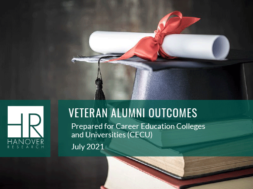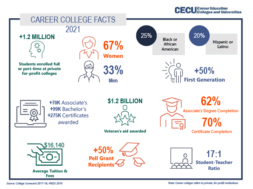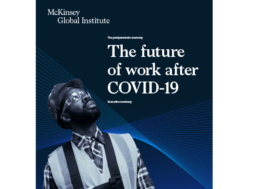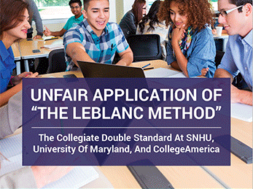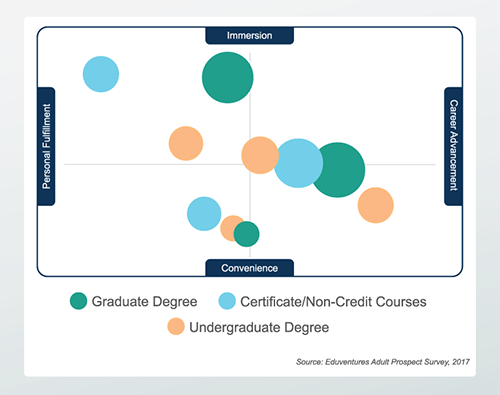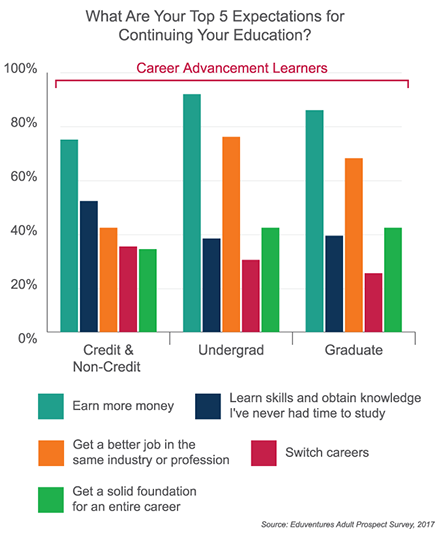
No More Square Pegs in Round Holes: Eduventures’ Adult Learner Mindsets
By Howard Lurie, Principal Analyst, Online and Continuing Education, Eduventures, A Division of the National Research Center for College and University Admissions (NRCCUA)
We hear a lot these days about enrollment “fit” – the need for prospective students and schools to be closely aligned in order to ensure high retention and graduation rates. A laudable cause, no doubt, when it comes to the “traditional” student: those first-time, full-time enrollees entering college right out of high school. Eduventures’ recent “Prospective Student Mindsets” provides invaluable insights into understanding these students. (https://encoura.org/rethinking-student-lifecycle-view-summit-2016/).
But how can “fit” be applied to the ubiquitous adult learner? While schools have learned much about the range and variety of traditional learners, the same cannot always be said for older, working students, who are subject to a web of economic conditions, prior educational experiences, and the demands of work and family.
In 2016, Eduventures’ Adult Learner Survey pointed to the emergence of several key trends. During the adult and online enrollment boom of 2005-2012, adult learners benefited from a broad range of options when deciding how and when to return to school. Between 2012 and 2016, as the U.S. economy slowly recovered from the Great Recession, adult learner perceptions of the value of higher education began to shift.
Adult learners began to express greater interest in non-degree programs as they increasingly questioned the value of longer, more expensive degrees.
Further, they showed a greater willingness to seek out programs that effectively balanced online and on-campus learning opportunities.
Unfortunately, U.S. schools have not always adequately met the evolving needs of adult learners. The scope and scale of this problem can be overwhelming: the Lumina Foundation recently reported that 40 percent of U.S. residents aged 25-34 lack a degree or credential from a college or university, equaling roughly 36 million adults (https://www.luminafoundation.org/goal_2025). Clear, precise and actionable data about how these students learn is long overdue.
The National Center for Educational Statistics’ use of age 25 as a demarcation between “traditional” and “non-traditional” students leaves huge diversity unexamined. What similarities actually exist between a 26-year-old prospective graduate student and a 45-year-old, unemployed worker with a high school diploma seeking an undergraduate certificate to enter a new industry?
Adult learners are anything but monolithic. While many respond to affordable and flexible programs, their ability to persist and successfully complete a certificate or degree program reflects a far more complex set of perceptions, attitudes, and behaviors.
A new lens for adult learner behavior and perceptions
Eduventures’ 2017 “Adult Prospect Survey” acknowledges this complexity and sheds new light on the range and variety of behaviors and preferences among adult learners. This study is part of a multi-year effort by Eduventures to build a more precise and actionable understanding of the variety in the prospective adult learner market. The 2017 research features a set of behavioral and attitudinal segmentations derived from the responses of 3,000 nationally representative adults who have indicated that they plan to return to school to either complete a degree or some other credential.
Eduventures organized the 2017 survey responses based upon respondents’ program level preference:
- Prospective Learners Seeking Certificates, Courses, and Non-Credit
- Prospective Learners Seeking an Associate or Bachelor’s Degree
- Prospective Learners Seeking a Graduate Degree
In order to better understand the diverse ways in which prospective adult learners perceive opportunities for continuing their educations, Eduventures organized survey responses into three categories based on respondents’ program-level preferences. Segmentations of prospective learners were then developed based on their responses to a series of filtering questions:
- What are the top five expectations you have for continuing your education?
- What are the top five experiences you expect to learn the most from while continuing your education?
- What are the top three features you care about the most when selecting a degree, certificate, or noncredit program?
For each segment, a descriptive Mindset was created using a latent class analysis (LCA), a statistical technique used to uncover hidden groups within a data set, based on the pattern of responses to a set of categorical questions.
While it is commonly understood that adult prospects can be distributed along a continuum between career advancement and personal fulfillment, our research provides sharper analysis of a less-understood dimension: some learners opt for in-depth immersive learning experiences, putting their work and family life on hold, while others place a higher value on convenience. The combination of these factors provides greater clarity and new insight into prospects’ attitudes and behaviors regarding school. Figure 1 arrays the 2017 undergraduate Mindsets for adult prospects along these dimensions.
Figure 1
When viewed together, there are patterns of overlap and distinction among these Mindsets. It becomes clear that prospective adult learners cannot be thought of as only seeking affordable and flexible ways to complete or continue their education. Instead, these Mindsets can serve as a set of lenses, enabling a more precise understanding of the range of attitudes, preferences, and expectations these learners have regarding their education.
This study suggests that institutions, vendors, and service providers may find benefit by using these Mindsets to refine and target their messaging and programming. Rarely should an institution seek to recruit only one Mindset; a large and diverse recruiting pool is preferable. Every Mindset is demographically complex, but some populations are more prominent in particular Mindsets than others. If institutions and service providers can use these Mindsets to more accurately classify particular prospects and respond in ways more likely to resonate, there is the opportunity to increase marketing efficiency and market differentiation.
These Mindsets also expose faulty assumptions and blind spots about prospective adult learners and invite institutions to educate as well as accommodate. These 10 Mindsets, however, are not the end of the story. Eduventures clients are now exploring the 2017 “Adult Prospect Survey” data in Encoura Data Lab in order to isolate specific programs or demographics of interest. As this sample evolves during the coming years, we anticipate further Mindsets emerging as sub-groups of these 10.
Mindsets in-depth
Among the 10 Mindsets revealed by this report, certain patterns emerge. For example, many prospective adult learners prioritize career goals and they do so in distinct ways. When asked why they wanted to return to school, prospects seeking career advancement through certificates or non-credit courses, expressed distinct distinctions when compared to undergraduate and graduate prospects seeking to move ahead in their career.
Figure 2 illustrates that although these prospects share a desire to earn more money, their desire to develop new skills, switch careers, or advance in their existing profession varies. This suggests that schools could improve their capacity to attract, enroll and support career-minded prospects by better understanding these patterns, rather than assuming entirely consistent behavior and preferences.
Figure 2
Eduventures also uncovered distinctiveness among prospects seeking associate and bachelor’s degrees. As a group, adult prospective students interested in either an associate or bachelor’s degree tend to be younger than non-degree prospects but older than prospective graduate students. Some individuals with these undergraduate Mindsets see a degree as a way to advance in their current jobs or professions, while others seek a career change. Still, others prioritize personal growth and transformation rather than a specific path.
Additionally, about 40 percent of undergraduate prospects have enrolled in college in the past but left short of a degree (the majority with less than 30 credits). Roughly another 25 percent have an associate degree.
A slim majority has already incurred education debt. These undergraduate prospects will be the most anxious about further borrowing.
Among undergraduate prospects with “some credit, no degree,” there is significant interest in credit transfer arrangements and opportunities for recognition of prior experience. Fewer than 20 percent of undergraduate prospects have never enrolled in college. Prospective undergraduate students report the lowest average household income across all the Mindsets, but the average spans a wide income range.
This just scratches the surface of what a Mindset approach to recruiting can tell us. Mindsets serve as a window into the deep-seated concerns these learners have about the risks, both financial and personal, that they assume by returning to school. These kinds of insights can help institutions make more informed decisions about how to recruit, retain, and support these students.
Converting insights into action
A Mindset-driven approach to understanding the complexities of these prospects can dispel the fallacy of a monolithic adult learner. Instead, these adult Mindsets can serve as descriptive guideposts to the range and variety of learner behaviors, preferences, and attitudes; they provide a differentiated understanding of how adult learners view the prospect of returning to school.
This study also examines attitudes toward the comparative prestige of certificates versus degrees, perceptions of online and blended learning, and concerns over debt. Data about price sensitivity and value for certificate and degree programs can also be assessed through the lens of these Mindsets.
Based on these new insights into adult learners, here are the three questions we think every school that enrolls adult learners should be asking:
- How do the demands of balancing life, work, and school impact the way adults think about learning, teaching, and the expectations of a certificate or degree program?
- How might prior experiences in school impact adults’ willingness to return to school and their ability to persist through difficult challenges?
- Are all adult learners motivated by the same economic forces, or are there subtle differences among them?
Additional information about Eduventures can be found at https://encoura.org/products-services/eduventures-research-and-advisory-services/
HOWARD LURIE joins Eduventures with more than 20 years of experience in developing and implementing online education technology solutions for the higher education, corporate and K-12 markets. He has recently co-authored Eduventures’ report on competency-based education, Deconstructing CBE: An Assessment of Institutional Activity, Goals and Challenges in Higher Ed. In addition to research on CBE, Howard focuses on understanding the adult learner market, alternative credentials, and analyses of online program management services. Previously, Howard served as Managing Director for Academic Partnerships at Acrobatiq, where he led efforts to secure new partnerships with a broad range of higher education institutions, as well as the Bill and Melinda Gates Foundation. Howard has also served as a Vice President for External Affairs at edX, and was a founder and Managing Director for PBS LearningMedia. Earlier, he directed online teacher professional development programs for WGBH Boston and for Facing History and Ourselves. Howard is a graduate of the University of Massachusetts at Amherst and Teachers’ College, Columbia University.
Contact Information: Howard Lurie // Principal Analyst, Online and Continuing Education // Eduventures, A Division of the National Research Center for College and University Admissions (NRCCUA) // 617-733-1043 // hlurie@eduventures.com // https://encoura.org/products-services/eduventures-research-and-advisory-services/ // Social Media: #EVHowardLurie

